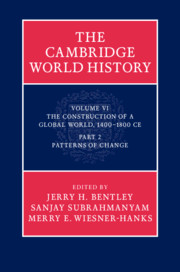Book contents
- The Cambridge World HistoryVOLUME VI
- The Cambridge World History
- The Cambridge World History
- Copyright page
- Dedication
- Contents
- Figures
- Maps
- Tables
- Contributors
- Preface
- Part One Migrations and Encounters
- 1 Global migrations
- 2 Patterns of warfare, 1400–1800
- 3 The first global dialogues: inter-cultural relations, 1400–1800
- 4 Legal encounters and the origins of global law
- Part Two Trade, Exchange, and Production
- Part Three Religion and Religious Change
- Part Four Questions of Method
- Index
- References
1 - Global migrations
from Part One - Migrations and Encounters
Published online by Cambridge University Press: 05 May 2015
- The Cambridge World HistoryVOLUME VI
- The Cambridge World History
- The Cambridge World History
- Copyright page
- Dedication
- Contents
- Figures
- Maps
- Tables
- Contributors
- Preface
- Part One Migrations and Encounters
- 1 Global migrations
- 2 Patterns of warfare, 1400–1800
- 3 The first global dialogues: inter-cultural relations, 1400–1800
- 4 Legal encounters and the origins of global law
- Part Two Trade, Exchange, and Production
- Part Three Religion and Religious Change
- Part Four Questions of Method
- Index
- References
Summary
- Type
- Chapter
- Information
- The Cambridge World History , pp. 3 - 28Publisher: Cambridge University PressPrint publication year: 2015

